Michigan v. Ohio: Winners in Wine
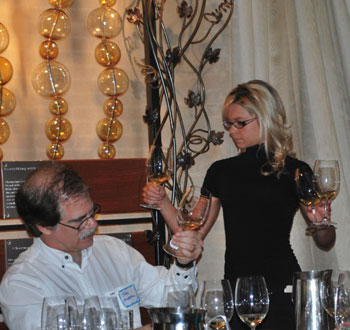
Joel Goldberg inspects a pouring of white wine – either from Michigan or Ohio – as Heidi Kabanuk, Vinology's wine director, brings out more offerings to be judged on Sunday evening. A similar wine judging took place the following night in Columbus, Ohio.
“Did you hear why the Michigan-Ohio State game might be canceled? Because Michigan can’t get past Toledo.”
David Creighton told the joke while sitting at a table in Vinology’s Bubble Room with Joel Goldberg and Claudia Tyagi, waiting to be served 30 glasses of wine. Each. Everyone laughed – and they weren’t even hammered.
In fact, despite the fact that plenty of people who are focused on the Michigan-Ohio State rivalry this weekend will be intent on getting hammered, the gathering at Vinology on Sunday evening had an entirely different goal: To highlight the quality of each states’ wines, in the setting of a friendly competition staged in Ann Arbor and Columbus.
Here’s some words about the event for you to savor before we reveal the winners, but if you read The Chronicle like you drink your wine – straight from the bottle in one long chug – scroll right down to the bottom.
Sunday’s event illustrates the power of personal networks. Andrew Hall, who’s involved with Slow Food Columbus, had originally envisioned a kind of anti-Beaujolais Nouveau campaign, intended to highlight Ohio wines at a time when this year’s Beaujolais hits the shelves – that happened on Thursday. He talked with Bear Braumoeller, an Ohio State professor and another Slow Fooder, who suggested linking it to the Michigan-OSU rivalry. Braumoeller contacted his friend Julie Weatherbee, who agreed to handle the logistics under the auspices of Slow Food Huron Valley in Ann Arbor. That included the task of finding a venue.
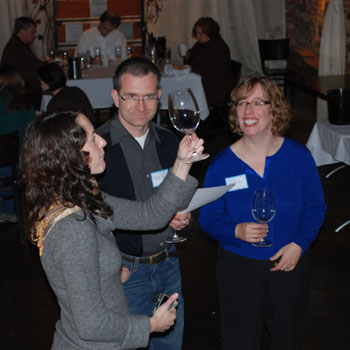
Julie Weatherbee, right, handled the logistics for Sunday's wine tasting in Ann Arbor. Next to Weatherbee is her husband, Bob Droppleman. Inspecting the contents of the glass is Shana Kimball, one of the three Gastronomical Three, which is a local blog with a focus on food. In the background, the judges do their work.
After a bit of a search, she ended up at Vinology, which donated their basement Bubble Room, as well as the services of Heidi Kabanuk, the restaurant’s wine director and private events manager. They also provided some of the Michigan wines at cost, baskets of their made-in-house crackers to cleanse the pallet, and a few plates of hors d’oeuvres for the judges and 20 or so other guests who attended.
Weatherbee was also tasked with finding judges. At about this same time, The Chronicle published a wine column by Goldberg, which Weatherbee saw. She contacted him and he agreed to enlist others he knew in the wine community. Goldberg, whose column will appear in The Chronicle on the first Saturday each month, is editor of the MichWine website. He pulled in David Creighton, who has worked in the wine industry for 35 years and is currently writing a wine column for The Ann Arbor News, and Claudia Tyagi, a wine consultant and member of the elite Court of Master Sommeliers. The fourth original judge – Chris Cook, who was this year’s chief judge of the Michigan Wine & Spirits Competition couldn’t make the event. Goldberg’s wife Sally, a former editor of a wine trade magazine in South Africa who arrived a few minutes after the tasting began, was drafted to act as the fourth judge, with a minimum of arm-twisting.

Claudia Tyagi, a member of the Court of Master Sommeliers and a judge for the Michigan-Ohio Wine Clash.
Wines were brought out in flights of two to six glasses per category, beginning with sparkling wines. Though all had served as judges many times before, they were first briefed by Hall about the peculiarities of this particular contest. Primarily, that included the fact that they were using a 20-point system rather than the more common 100-point scale, and they were asked not to use half points. (This caused a bit of mild consternation – the judges felt that the 20-point scale did not allow for nuance, especially without the half-point option, but they did not press the issue.)
Hall provided scoring sheets, which outlined the maximum number of points allowed in each of five categories: appearance, aroma/bouquet, taste/texture, aftertaste/finish and overall impression. Each glass was marked with a number written on a tag that was affixed to the stem of the glass – only after the judging was completely finished for the evening did they learn which wines had been served.
After this point, much of the evening went like this: Swirl, sniff, sip, spit. Repeat.
The spitting part happened discretely into a mug, then when the mug reached capacity, judges would pour the liquid into one of two buckets set on the floor.
The judges remarked that this competition was more solitary than most. Typically, judges are asked to score after reaching a consensus, and so spend much time talking with each other about the various qualities and characteristics of the wine. On Sunday, things were often quite quiet.
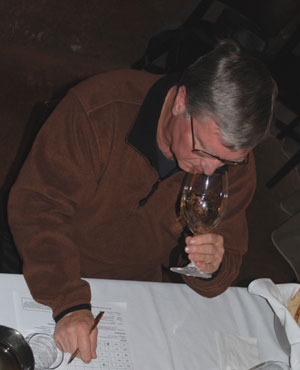
David Creighton, a wine expert who currently writes a column for The Ann Arbor News. None of the judges wore maize, blue or red.
That’s not to say there wasn’t lively banter from time to time. Here are some of the judges’ more descriptive comments from throughout the evening:
- “It tastes like soap – acidic soap.”
- “This actually hurts my teeth.”
- “Is it gold enough for you?”
- “This is everything I don’t like in a California Chardonnay – and I found it in a Michigan Chardonnay!”
- “The older vintages are sublime when the oak drops out. But this one hasn’t reached sublimity yet.”
- “That’s as bretty as they get.”
- “For a lot of wines, it’s like opening a musty closet – they need to get out and stretch.”
So for The Chronicle, it was quite a spectator sport. And since it was abundantly clear that we don’t know the first thing about wine, the judges were gracious enough to try to explain what they were seeing, smelling and tasting. Exchanges went something like this:
David Creighton, deftly swirling the wine in his glass: “Smell this.”
The Chronicle, sticking our nose into the glass and breathing deeply: “Mmmm.”
Creighton: “It’s sulfur.”
The Chronicle: “Er…is that bad?”
The correct answer is yes.
On Monday, a similar judging occurred in Columbus, after which Hall compiled the results. He hopes this becomes an annual event, with the goal of promoting wines in both states, increasing consumer demand and prompting more restaurants to add local wines to their offerings. It might also increase the availability of Michigan wines in Ohio, and vice versa. Currently, state laws require that wine be sold through distributors, who often don’t have the economic incentive to deal with small local wineries, Hall said, especially ones that are out-of-state.
And now, the results you’ve been waiting for – the winners of the Great Wine Clash of ’08. In this competition, at least, it was a pretty good year for Michigan:
- Sparkling Wine: Shady Lane Cellars Blanc de Blancs 2000 (MI)
- Aromatic White: Ferrante “Golden Bunches” Riesling 2007 (OH)
- White Wine: Black Star Farms “Arcturos” Chardonnay sur lie 2006 (MI)
- Pinot Noir: Black Star Farms “Arcturos” Pinot Noir 2006 (MI)
- Red Wine: Kinkead Ridge Revelation 2006 (OH)
One final note: The “Arcturos” Chardonnay sur lie was Goldberg’s pick, in his Nov. 1 Chronicle column, for the best bargain in the city, at $11. Read about his other finds here.
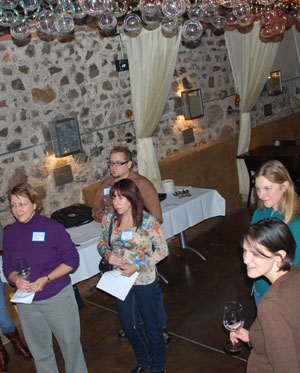
Guests at the Ohio vs. Michigan Wine Clash – many of them members of Slow Food Huron Valley – watch the judges do their thing.
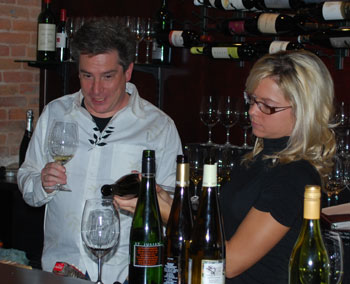
Andrew Hall, who organized the Ohio vs. Michigan Wine Clash, and Heidi Kabanuk, Vinology's wine director, pour wine for the judges. Heidi reports that she can carry 12 wine glasses at a time.




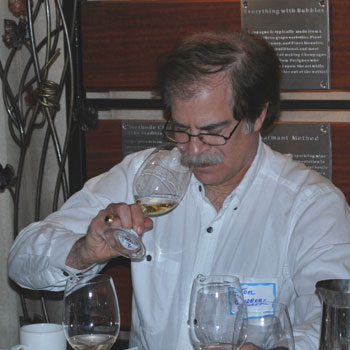
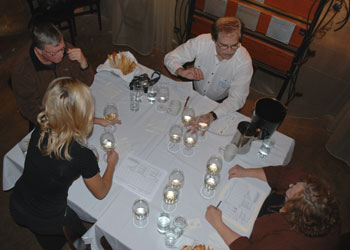
Thanks to the Chronicle for attending and reporting on this event! It was fun to try so many really good wines from Michigan (and Ohio). With all the bad news coming out of Michigan, it is good to know that we can do a lot of things right! I know several bottles I’ll be picking out for Thanksgiving dinner. (Come to think of it, a nice bottle of Michigan wine and a set of glasses from Kiwanis or Treasure Mart would make a great and inexpensive holiday gift!) As noted in the article, I’d like to give special thanks to Vinology for all their support of local food and wine and for providing that beautiful room!